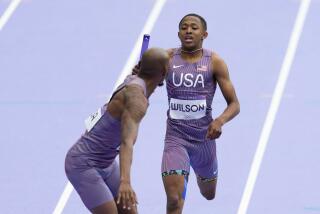Watts’ Bad Hamstrings Led to Olympic Gold
- Share via
Were it not for a pair of tender hamstrings, Quincy Watts might never have won gold medals in the 400 meters and 1,600 relay in the 1992 Olympic Games in Barcelona.
Watts, a 1988 graduate of Taft High, broke the Olympic record twice in the 400 and ran the second leg on a world-record-setting relay team in Barcelona. But it’s doubtful he would have become a quarter-miler had he not sustained a series of hamstring injuries from 1988-90.
A three-time state champion in high school, Watts was the No. 1-ranked 100 and 200 sprinter in the nation by Track & Fields News magazine as a junior. But the 6-foot-3, 185-pounder strained his right hamstring during a dual meet against El Camino Real during his senior year.
The injury sidelined him for six weeks. During the layoff, Taft assistant coach Hilliard Sumner decided Watts would run the 400 instead of the 100 because it would put less strain on his hamstrings.
Watts, an all-Valley basketball player during his senior season at Taft, set a then-region record of 46.67 in the 400 and won the City Section title. But he dropped the event in the state championships in an effort to win an unprecedented third consecutive title in the 200.
Bryan Bridgewater of Washington edged Watts for the state title, 21.00-21.02, but Watts still considered himself a 100-200 sprinter during his first two years at USC.
His hamstrings wouldn’t cooperate, however.
He strained the right one in his freshman year and injured the left one twice as a sophomore.
The second injury came in a 200 semifinal in the NCAA championships, and the 400 was Watts’ event the following year.
Watts, who set region records of 10.30 in the 100 and 20.50 in the 200 as a Taft junior, had always disliked the 400 because of the pain and fatigue involved. But he began warming to the event after he placed second in the NCAA championships, third in The Athletics Congress final in a career-best 44.98 and earned a No. 10 world ranking by Track and Field News.
He really took off in 1992, lowering his career best six times and running 44.00 or faster a then-unprecedented five times.
The 44.00 clocking won the NCAA title in June and his best of 43.50 gave him the Olympic title two months later.
The time was the second-fastest ever run behind Butch Reynolds’ then-world record of 43.29, but Watts’ most impressive performance might have come two days earlier when he won his semifinal in 43.71, despite easing up in the final 20 meters.
His gold-medal victory came at such as young age, 22, that some track experts figured he had a good chance to become the first man to win consecutive Olympic titles in the event. Instead, his sprint fortunes have waned while American Michael Johnson has arguably become the greatest 200 and 400 performer of all time.
Watts was ranked No. 4 in the world in the 400 in 1993 and had a season best of 44.13. But he failed to break 45 seconds in 1994 and ‘95, and finished eighth in the 1996 Olympic trials before moving up to seventh after a fellow competitor was disqualified.
He ran 46.69 in 1997 and 46.17 this year after having an unsuccessful tryout with the San Diego Chargers in 1998.
Nonetheless, Watts is the only graduate of a Valley high school to win an individual Olympic title in track and field.
The Detroit native moved to Woodland Hills in 1984 to live with his father, Rufus, because his mother, Allidah Hunt, thought he needed a male role model. He led Taft to the 1986 state title as a sophomore by winning the 200, finishing second in the 100 and anchoring the second-place 400 relay team.
He won state titles in the 100 and 200 as a junior before his hamstring troubles began as a senior.
Although Johnson holds world records in the 200 (19.32) and 400 (43.18) and became the only man to win Olympic titles in both events in 1996, many track experts still dream about a hypothetical matchup between the Watts of 1992 and the Johnson of ’96.
More to Read
Go beyond the scoreboard
Get the latest on L.A.'s teams in the daily Sports Report newsletter.
You may occasionally receive promotional content from the Los Angeles Times.






